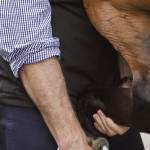Gene Therapy for Tendon, Ligament Injuries in Horses

Even with extensive rest and appropriate rehabilitation equine tendon injuries frequently recur. Some owners rely on the “kitchen sink” approach in an effort to help their horses, mixing complementary and regenerative therapies with traditional approaches. Despite the best care, recurring tendon injuries prematurely end many athletic careers.
“Regenerative therapies such as stem cells and platelet-rich plasma have helped horses return to athletic function following a soft tissue injury, but equine researchers and veterinarians know that we can still do better,” explained Laura Petroski, B.V.M.S., a veterinarian for Kentucky Equine Research (KER).
A novel approach to treating therapies was recently described by a group of scientists from the United Kingdom. Their technique involved using gene therapy to create specific genes that, once injected into the horse, produce proteins that help heal the injury.
“The use of recombinant proteins and gene therapy is the most advanced and promising approach in the treatment of musculoskeletal disorders in human medicine. To date, direct gene therapy of equine tendon injuries has never been employed,” explained the researchers.
In the study, the researchers selected two “therapeutic” proteins: vascular endothelial growth factor 164 and fibroblast growth factor 2. Both of these proteins were chosen due to their roles in restoring normal tissue strength and elasticity instead of producing weak scar tissue.
To test whether gene therapy is a viable option for soft-tissue injuries, two horses with naturally occurring lesions were selected to study. DNA encoding the two therapeutic proteins was injected directly into the lesions (one was a suspensory ligament injury, the other had a defect in the superficial digital flexor tendon) within three months of lameness onset.
“Both horses experienced full recovery and complete restoration of the affected ligament and tendon based on repeated ultrasound examinations,” said Petroski. “Additional data regarding safety and efficacy are needed, but this preliminary study certainly suggests that gene therapy is worthy of continued study.”
Products traditionally classified as joint supplements may also benefit tendons and ligaments.
“Glucosamine and chondroitin sulfate products, including KER•Flex, support soft tissues,” Petroski recommended. In Australia, look for Glucos-A-Flex.








